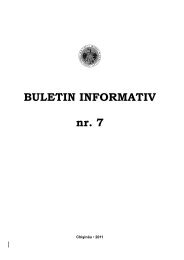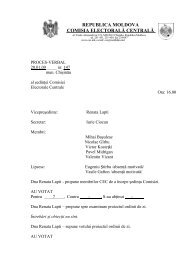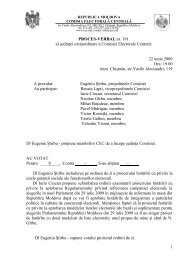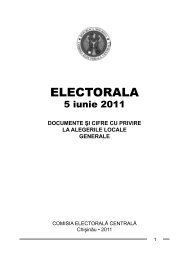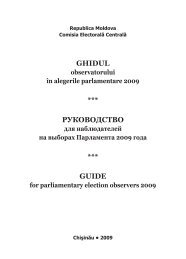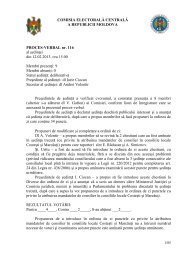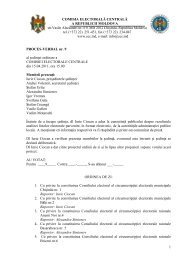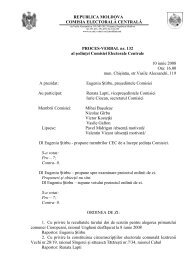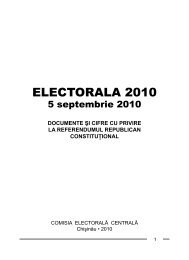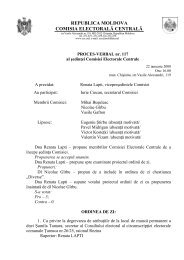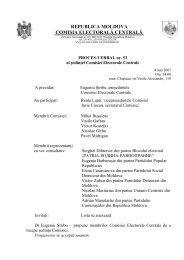noile tehnologii în formarea Åi utilizarea listelor electorale ... - Cec.md
noile tehnologii în formarea Åi utilizarea listelor electorale ... - Cec.md
noile tehnologii în formarea Åi utilizarea listelor electorale ... - Cec.md
- No tags were found...
Create successful ePaper yourself
Turn your PDF publications into a flip-book with our unique Google optimized e-Paper software.
Conferinţa internaţională.<br />
NOILE TEHNOLOGII ÎN FORMAREA ŞI UTILIZAREA LISTELOR ELECTORALE. EVOLUŢII ŞI PERSPECTIVE 225<br />
registry are the bodies in charge of registering citizens at their residence and issuing/<br />
changing local passports – currently it’s the Federal Migration Service. There are also<br />
Civil Registry offices, bodies of military conscription, penitentiary bodies and courts.<br />
At preset intervals these bodies submit to the head of local administration (municipality)<br />
the information on changes in place of residence, issued or changed<br />
passport, citizen’s death, conscription to military service, incarceration or passing<br />
of a court decision on incapability of a citizen. The head of the local administration<br />
in turn submits consolidated data to the election commission which accounts<br />
for the voter or excludes the voter from the lists.<br />
Let’s say, a citizen moved into a certain territory - the information about it is<br />
transferred by the Federal Migration Service (FMS) to the municipality, which informs<br />
the election commission that includes the person as a voter. If the citizen<br />
checked out to live someplace else or death is registered the information is transferred<br />
to the head of local administration and then to the election commission<br />
and the citizen is taken off the registry. Same way a citizen is excluded from voter<br />
registry if the information is received that he/she is serving a court sentence or is<br />
declared incapable by court.<br />
Of course the election commissions have to process enormous amounts of information.<br />
To give you an idea, in Moscow City alone about 100,000 entries are<br />
transferred each month; the number of entries processed in the Russian Federation<br />
over a month may be over 1 Million, whereas no mistakes are admissible<br />
in processing. Each territorial election commission (TEC) maintains the Federal<br />
Voter Registry consolidating information regarding all voters in the Russian Federation.<br />
Today the Registry contains 107 million entries and it is being updated<br />
based on the information received by election commissions.<br />
At least quarterly the information is submitted by territorial level to the region<br />
(level of the Subject of the Russian Federation) and then to the federal level. This<br />
procedure is primarily there to eliminate double entries (when one voter may<br />
appear in two voter registries, let’s say, in Moscow and St. Petersburg). This way,<br />
we have updated information about all voters in Russia at the territorial, regional<br />
and federal levels.<br />
The Voter Registry data can be used in the operation of election commissions,<br />
e.g., to verify information about those who signed lists in support of candidates/



